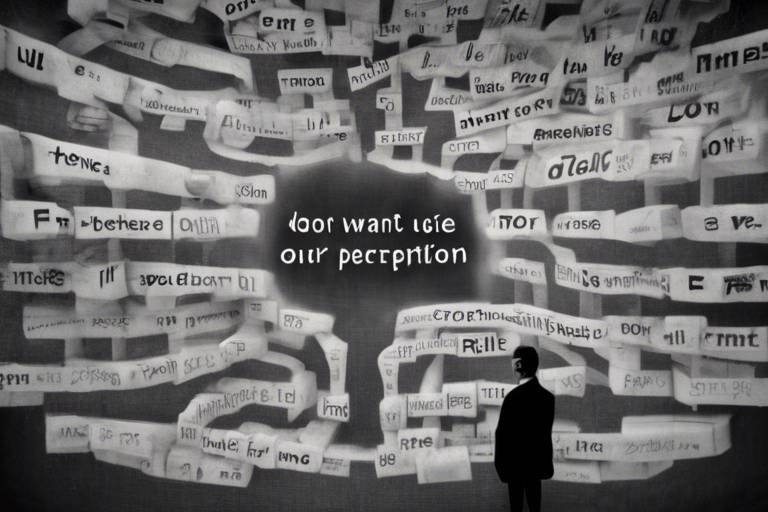Ontology: Exploring the Unknown Territories of Reality
Ontology is a captivating field that digs deep into the very essence of existence. It’s like peeling back the layers of an onion to reveal the core of what it means to be. Imagine standing at the edge of a vast, uncharted territory, where every question leads to another, and every answer opens up even more mysteries. This article delves into the fascinating world of ontology, examining its principles, significance, and the implications it holds for our understanding of reality and the nature of being.
To grasp ontology, we must first understand its foundational concepts and historical roots. The term itself originates from the Greek words 'ontus' (being) and 'logos' (study), which together mean the study of being. Think of it as the philosophical backbone that supports all other areas of inquiry. Key philosophers like Aristotle, who is often referred to as the father of ontology, laid the groundwork for this discipline. He introduced the idea that substances are the primary entities in the world, and everything else derives from them. Fast forward to the modern era, and we see thinkers like Martin Heidegger and W.V.O. Quine reshaping our understanding of existence and reality through their innovative perspectives.
At the heart of ontology lie fundamental questions that challenge our understanding of existence. What is existence? What does it mean to be? These questions may seem simple at first glance, but they are anything but. They require us to confront our assumptions and explore the very fabric of reality. Consider this: if a tree falls in a forest and no one is there to hear it, does it make a sound? This age-old philosophical dilemma encapsulates the essence of ontological inquiry—how do we define existence and reality in a world filled with subjective experiences?
In exploring the distinction between existence and non-existence, we encounter various theories that address the nature of being. For instance, some philosophers argue that existence is a property that entities possess, while others contend that it is merely a matter of linguistic convention. The implications of these theories are profound. If existence is a property, then what does it mean for something to not exist? This leads us to ponder the nature of non-existence itself. Are non-existent entities merely figments of our imagination, or do they hold some form of reality in a different context?
When discussing ontology, it’s essential to contrast realism and anti-realism. Realism posits that the world is independent of our perceptions; in other words, entities exist regardless of whether we perceive them. On the other hand, anti-realism suggests that our understanding of reality is fundamentally shaped by our experiences and perceptions. This dichotomy shapes our understanding of what is real and what is not. Think of it like a pair of glasses: do you see the world as it is, or do your experiences tint your view? The answer could change everything.
Ontological commitment refers to the entities that a particular philosophical position accepts as part of its understanding of reality. Different philosophical frameworks lead to different ontological commitments. For instance, a materialist perspective commits to the belief that only physical entities exist, while an idealist perspective may prioritize mental constructs. This commitment shapes not only how we view the world but also how we interact with it. Understanding these commitments can help us navigate the complex landscape of philosophical thought.
As we venture into modern philosophy, we see how contemporary thinkers have influenced ontology. The evolution of thought from classical ideas to modern interpretations has been remarkable. Philosophers like Daniel Dennett and Graham Harman have adapted ontological discussions to fit within the context of current scientific understandings. They challenge us to reconsider our definitions of existence in light of advancements in science and technology. This ongoing dialogue between philosophy and science enriches our understanding of reality and encourages us to explore new territories of thought.
Ontology is not just an abstract philosophical pursuit; it has practical implications across various fields. From artificial intelligence to information science, the principles of ontology play a crucial role in shaping our understanding of complex systems and data.
In the realm of artificial intelligence, ontological frameworks are applied to enhance understanding and reasoning about data. By defining categories and relationships within data, AI systems can make more informed decisions, much like a librarian organizing books in a library. This structured approach allows machines to interpret and process information more effectively, leading to advancements in machine learning and natural language processing.
In information science, ontology is vital for organizing and retrieving information. It helps create a shared vocabulary that enables effective communication between systems. This is particularly important in database management and semantic web technologies, where clear definitions of entities and their relationships can significantly improve data retrieval and analysis. Think of it as a roadmap that guides users through the vast landscape of information, ensuring they find exactly what they need.
- What is ontology? Ontology is the philosophical study of being, existence, and the nature of reality.
- Who are some key philosophers in ontology? Notable figures include Aristotle, Martin Heidegger, and W.V.O. Quine.
- How does ontology apply to artificial intelligence? Ontological frameworks help AI systems understand and process data more effectively.
- What is the difference between realism and anti-realism? Realism asserts that entities exist independently of our perceptions, while anti-realism suggests that our understanding of reality is shaped by our experiences.

The Foundations of Ontology
Ontology, at its core, is the philosophical study of being, existence, and the nature of reality. It's like peeling back the layers of an onion, revealing deeper truths about what it means to exist. The term itself originates from the Greek words "ontus," meaning being, and "logos," meaning study or discourse. This intriguing field has roots that stretch back to ancient philosophy, where thinkers like Aristotle laid the groundwork for ontological inquiry. Aristotle's work in his book Metaphysics introduced the idea that there are different categories of being, which paved the way for future discussions about existence.
Throughout history, various philosophers have contributed to the evolution of ontology. For instance, Immanuel Kant challenged traditional notions of existence by suggesting that our understanding of reality is shaped by our perceptions. He argued that while we can know phenomena (the world as we experience it), the noumena (the world as it is) remain largely inaccessible. This distinction is crucial in ontology, as it raises questions about the limits of human understanding and the nature of reality itself.
Another key figure is Martin Heidegger, who shifted the focus from abstract categories of being to the human experience of being. In his seminal work, Being and Time, Heidegger explored the concept of Dasein (being-there), emphasizing that our existence is intertwined with the world around us. He posited that to truly understand being, one must consider the context in which existence unfolds, thus deepening the ontological discourse.
As we delve into the foundations of ontology, it's essential to recognize its multifaceted nature. Ontology is not just about what exists; it's also about how we categorize and relate to those entities. This involves understanding various ontological categories, such as:
- Substance: The fundamental entities that exist independently.
- Properties: Qualities or characteristics that entities possess.
- Relations: The ways in which entities interact with one another.
These categories help us navigate the complex landscape of existence, allowing us to classify and comprehend the myriad forms of being. The interplay between these categories also leads to deeper philosophical questions about the nature of reality. For instance, can something exist without being perceived? This question has sparked debates among philosophers for centuries, revealing the intricate relationship between perception and existence.
In contemporary philosophy, ontology has expanded its scope to include discussions about virtual realities and the implications of technological advancements. As we create digital spaces that mimic our physical world, the question arises: do these virtual entities possess a form of existence? This intersection of ontology and technology challenges our traditional understanding of what it means to be, pushing the boundaries of philosophical inquiry.
In conclusion, the foundations of ontology serve as a crucial framework for exploring the complexities of existence. By examining the contributions of key philosophers and the fundamental categories of being, we gain valuable insights into the nature of reality. As we continue to question and explore these ideas, ontology remains a vibrant and essential field of study, inviting us to ponder the profound mysteries of existence.
- What is the main focus of ontology? Ontology primarily focuses on the study of being, existence, and the nature of reality.
- Who are some key philosophers in ontology? Key philosophers include Aristotle, Immanuel Kant, and Martin Heidegger.
- How does ontology relate to modern technology? Ontology explores the implications of virtual realities and digital entities, questioning their existence and nature.

Key Philosophical Questions
When we dive into the realm of ontology, we find ourselves confronted with a tapestry of profound questions that challenge our understanding of existence. These questions are not just academic; they resonate deeply with our everyday lives. For instance, have you ever paused to ponder, What is existence? or What does it mean to be? These inquiries are at the heart of ontological exploration, serving as gateways to understanding the very fabric of reality.
At its core, ontology seeks to unravel the mysteries surrounding our being. It pushes us to consider not only our own existence but also the existence of everything around us. Imagine standing in a vast forest, surrounded by towering trees and the sounds of nature. You might wonder, Are these trees merely objects, or do they possess a form of being that connects them to the universe? Such reflections lead us to consider the essence of existence itself.
One might argue that existence is a given, something we take for granted. However, the act of questioning existence reveals layers of complexity. For example, consider the distinction between existence and non-existence. This dichotomy is not just a philosophical exercise; it has real implications for how we perceive reality. Are we merely products of our environment, or do we have an intrinsic value that defines our being?
The exploration of existence versus non-existence is akin to navigating a dark labyrinth. On one side, we have existence, a realm filled with tangible entities and experiences. On the other, non-existence looms—a void that raises unsettling questions. What does it mean for something to exist? Is existence a characteristic inherent to an entity, or is it a label we assign based on perception?
Philosophers have long grappled with these concepts, leading to various theories that attempt to clarify the nature of being. For instance, the distinction between realism and anti-realism plays a crucial role in this discussion. Realists assert that entities exist independently of our perceptions, while anti-realists challenge this notion, suggesting that existence is contingent upon human thought and experience.
Realism posits that there is a reality that exists outside of our minds, a world that continues to exist whether we are aware of it or not. This perspective can be empowering, as it implies that our understanding of the world is grounded in something objective. However, anti-realism invites us to consider the possibility that our perceptions shape reality. It raises the question: Is reality a construct of our consciousness? This ongoing debate highlights the fluid nature of existence and our role in defining it.
Another pivotal aspect of ontology is ontological commitment, which refers to the entities we accept as part of our understanding of reality. This concept challenges us to examine our beliefs critically. For instance, when we say that something exists, we are making a commitment to its reality. But what criteria do we use to determine this? Is it based on empirical evidence, or do we rely on intuition and cultural beliefs?
Understanding ontological commitment helps us navigate the complexities of existence. It forces us to confront our biases and assumptions, ultimately enriching our grasp of reality. As we engage with these questions, we begin to see the interconnectedness of all things, prompting reflections on our place within the universe.
In summary, the key philosophical questions that ontology seeks to address are not merely abstract musings; they are fundamental inquiries that shape our understanding of existence. By grappling with questions of being, we embark on a journey of self-discovery and enlightenment, ultimately leading us to a deeper appreciation of the intricate web of reality.
- What is ontology? Ontology is the branch of philosophy that studies the nature of being, existence, and reality.
- Why is ontology important? It helps us understand the fundamental principles of existence and the relationships between different entities.
- How does ontology relate to other fields? Ontology has applications in various fields, including artificial intelligence, information science, and metaphysics.
- Can ontology answer all questions about existence? While ontology provides valuable insights, it may not have definitive answers to all existential questions.

What is existence?
This article delves into the fascinating field of ontology, examining its principles, significance, and the implications it holds for understanding existence, reality, and the nature of being.
This section outlines the basic concepts and historical roots of ontology, exploring key philosophers and their contributions to the understanding of existence and reality.
Here, we discuss the fundamental questions that ontology seeks to answer, such as and What does it mean to be?
At its core, the question of existence is a profound inquiry into the very nature of reality. We often take for granted that things exist—our friends, our favorite coffee shop, or even the stars in the night sky. But when we pause to think about it, what does it truly mean for something to exist? Is existence merely a state of being, or is it something more complex? Philosophers have grappled with this question for centuries, and their explorations have led to various interpretations and theories.
To understand existence, we must first distinguish it from non-existence. Imagine a world where nothing existed. It’s a mind-boggling concept, right? Yet, this contrast helps us appreciate what it means to be. Some philosophers, such as René Descartes, posited that existence is tied to consciousness—his famous declaration "I think, therefore I am" suggests that the act of thinking is proof of existence. Others, like Martin Heidegger, approached existence from a more existential angle, emphasizing the importance of being-in-the-world and our interactions with it.
One way to break down the concept of existence is to consider the different categories it encompasses. These can include:
- Physical Existence: The tangible world around us, made up of matter and energy.
- Abstract Existence: Concepts, ideas, and emotions that don't have a physical form but still hold significance.
- Potential Existence: The possibility of something existing in the future or in a different context.
The exploration of existence also leads us to ponder the implications of our beliefs about what exists. For instance, if we accept that only what can be observed physically exists, we might dismiss the importance of emotions or thoughts. Conversely, if we acknowledge abstract concepts as real, we expand our understanding of reality to include the richness of human experience. This philosophical inquiry is not just academic; it shapes how we live our lives and interact with the world around us.
This subsection analyzes the distinctions between existence and non-existence, exploring theories that address the nature of being and the implications of each.
In this part, we contrast realism and anti-realism, examining how these perspectives shape our understanding of what is real and what is not.
This section focuses on ontological commitment, discussing how different philosophical positions determine the entities we accept as part of our understanding of reality.
We explore the influence of contemporary philosophers on ontology, highlighting how modern thought has evolved from classical ideas and adapted to current scientific understandings.
This section examines the practical implications of ontology in various fields, such as artificial intelligence, information science, and metaphysics.
Here, we discuss how ontological frameworks are applied in AI to enhance understanding and reasoning about data and knowledge representation.
This part explores the role of ontology in organizing and retrieving information, emphasizing its importance in database management and semantic web technologies.
- What is ontology? Ontology is the philosophical study of the nature of being, existence, and reality.
- Why is ontology important? It helps us understand the fundamental categories of existence and how they relate to each other.
- How does ontology apply to artificial intelligence? Ontological frameworks are used in AI to improve data understanding and knowledge representation.

and
This article delves into the fascinating field of ontology, examining its principles, significance, and the implications it holds for understanding existence, reality, and the nature of being.
Ontology, as a branch of philosophy, is the study of being, existence, and the categories of being. Its roots can be traced back to ancient philosophers like Aristotle, who first explored the concept of existence in his work "Metaphysics." Throughout history, thinkers such as Immanuel Kant and Martin Heidegger have contributed significantly to our understanding of ontology, shaping how we perceive reality and existence. These philosophical inquiries lay the groundwork for contemporary discussions about what it means to exist and how we categorize different entities within our reality.
At the heart of ontology lies a series of profound questions that challenge our understanding of existence. Questions such as “What is existence?” and “What does it mean to be?” invite us to ponder the very nature of reality. These inquiries are not merely academic; they resonate deeply with our everyday experiences. For instance, when we consider the existence of abstract concepts like love or justice, we are engaging with ontological questions that influence how we navigate our lives.
One of the central themes in ontology is the distinction between existence and non-existence. This inquiry leads us to explore various theories that address the nature of being. For example, the notion of existence can be understood in terms of physical presence, while non-existence raises questions about the absence of entities. Philosophers like Jean-Paul Sartre have argued that existence precedes essence, suggesting that individuals create their own meaning in an otherwise indifferent universe. This perspective challenges traditional views and invites us to consider the implications of our choices and actions in a world where existence is not guaranteed.
When discussing ontology, we must also consider the debate between realism and anti-realism. Realism posits that entities exist independently of our perceptions, while anti-realism suggests that our understanding of reality is shaped by our experiences and interpretations. This dichotomy profoundly influences how we approach knowledge and existence. For instance, a realist might argue that the laws of physics exist regardless of human observation, whereas an anti-realist might contend that our understanding of those laws is inherently subjective. This ongoing dialogue shapes our comprehension of what is real and what is not.
Ontological commitment refers to the entities that a philosophical position accepts as part of its framework for understanding reality. Different philosophical perspectives lead to varying commitments. For example, a materialist ontology might commit to the existence of physical entities only, while a dualist perspective might accept both physical and non-physical entities. This commitment impacts not only philosophical discussions but also practical applications in fields like science and technology, where understanding the nature of entities can influence research and development.
Modern philosophy has seen a significant evolution in ontological thought, influenced by contemporary thinkers who have adapted classical ideas to align with current scientific understandings. Philosophers like Daniel Dennett and Gilles Deleuze have expanded the conversation around ontology, incorporating insights from cognitive science and postmodern theory. This ongoing evolution reflects our quest to understand existence in an increasingly complex world, where traditional boundaries of being are often blurred.
The implications of ontology extend far beyond philosophy, impacting various fields such as artificial intelligence, information science, and metaphysics. Understanding how we categorize and interpret entities plays a crucial role in these domains, influencing both theoretical frameworks and practical applications.
In the realm of artificial intelligence, ontological frameworks are essential for enhancing understanding and reasoning about data. By establishing clear categories and relationships between entities, AI systems can improve their ability to process and interpret information. For instance, ontologies can help AI distinguish between different types of objects, enabling more sophisticated interactions and decision-making processes. This capability is crucial as AI continues to evolve and integrate into various aspects of our lives.
Ontology also plays a vital role in information science, particularly in organizing and retrieving information. In the age of big data, the ability to categorize and manage vast amounts of information is essential. Ontological frameworks provide the structure needed for effective database management and semantic web technologies, allowing users to access relevant information quickly and efficiently. This organizational capacity is invaluable in a world where information overload is a common challenge.
- What is ontology? - Ontology is the philosophical study of being, existence, and the categories of being.
- Why is ontology important? - It helps us understand the nature of reality and existence, influencing various fields such as philosophy, science, and technology.
- How does ontology apply to artificial intelligence? - Ontological frameworks enhance AI's ability to process and interpret data by categorizing entities and their relationships.
- What is the difference between realism and anti-realism? - Realism asserts that entities exist independently of perception, while anti-realism suggests that our understanding of reality is shaped by our experiences.

What does it mean to be?
This article delves into the fascinating field of ontology, examining its principles, significance, and the implications it holds for understanding existence, reality, and the nature of being.
This section outlines the basic concepts and historical roots of ontology, exploring key philosophers and their contributions to the understanding of existence and reality.
Here, we discuss the fundamental questions that ontology seeks to answer, such as What is existence? and
This subsection analyzes the distinctions between existence and non-existence, exploring theories that address the nature of being and the implications of each.
In this part, we contrast realism and anti-realism, examining how these perspectives shape our understanding of what is real and what is not.
This section focuses on ontological commitment, discussing how different philosophical positions determine the entities we accept as part of our understanding of reality.
We explore the influence of contemporary philosophers on ontology, highlighting how modern thought has evolved from classical ideas and adapted to current scientific understandings.
This section examines the practical implications of ontology in various fields, such as artificial intelligence, information science, and metaphysics.
Here, we discuss how ontological frameworks are applied in AI to enhance understanding and reasoning about data and knowledge representation.
This part explores the role of ontology in organizing and retrieving information, emphasizing its importance in database management and semantic web technologies.
When we ponder the question, “What does it mean to be?”, we are diving deep into the essence of existence itself. This inquiry is not just philosophical fluff; it strikes at the core of our understanding of reality and our place within it. To be, in its simplest form, suggests existence, but it transcends mere presence. It encompasses the quality and nature of that existence. Think of it like a stage play where every actor embodies their role; being is the performance that gives meaning to the character's existence.
At its core, being involves several dimensions:
- Consciousness: The awareness of oneself and the environment. It’s the lens through which we experience reality.
- Identity: The characteristics and qualities that define an individual or entity. It’s what makes you, you.
- Relationships: The connections we forge with others. These interactions shape our understanding of being.
Philosophers have long debated the nature of being. From Heidegger’s exploration of being as a state of existence intertwined with time and space, to the existentialists who argue that being is defined through choices and actions, the discourse is rich and varied. For instance, consider the existentialist view: if existence precedes essence, then we are not born with an inherent purpose; rather, we create our essence through our actions and decisions. This perspective empowers us to shape our reality actively, suggesting that to be is to engage with life meaningfully.
Moreover, the implications of this question extend beyond philosophy into everyday life. When we ask what it means to be, we are also questioning our values, our purpose, and our connections with others. Are we merely existing, or are we living fully? This distinction is crucial. Living fully implies embracing experiences, emotions, and relationships, creating a tapestry of existence that is vibrant and meaningful.
In summary, the question of what it means to be is a profound exploration of existence that invites us to reflect on consciousness, identity, and relationships. It challenges us to consider not just our presence in the world but the quality of that presence. Are we merely here, or are we truly alive in our existence?
- What is ontology? - Ontology is the philosophical study of the nature of being, existence, and reality.
- Why is ontology important? - It helps us understand the fundamental structure of reality and our place within it.
- How does ontology relate to artificial intelligence? - Ontological frameworks in AI help in organizing and reasoning about data, enhancing knowledge representation.
- Can ontology be applied in everyday life? - Yes, it encourages us to reflect on our existence, values, and relationships, shaping how we engage with the world.

This article delves into the fascinating field of ontology, examining its principles, significance, and the implications it holds for understanding existence, reality, and the nature of being.
At its core, ontology is the philosophical study of being. It seeks to answer profound questions about existence and the nature of reality. The term itself originates from the Greek words "ontus," meaning being, and "logos," meaning study. Historically, ontology has roots in ancient philosophy, with significant contributions from thinkers like Aristotle, who laid the groundwork for metaphysical inquiry. Aristotle's exploration of substance and essence established the foundation for later philosophical discourse. As we journey through the ages, we encounter philosophers such as Immanuel Kant, who challenged previous notions of reality, and Martin Heidegger, who emphasized the importance of being in his existential inquiries. Each of these philosophers has added layers of complexity to our understanding of ontology, making it a vibrant and continually evolving field.
Ontology is not just about dusty old books and abstract theories; it grapples with questions that resonate deeply with our everyday lives. For instance, What is existence? This seemingly simple question opens the floodgates to a myriad of discussions. Existentialists argue that existence precedes essence, suggesting that we create our own meaning. On the other hand, essentialists believe that our essence defines our existence. Another burning question is, What does it mean to be? This inquiry leads us to consider our identity, consciousness, and the very fabric of reality itself. These questions are not merely academic; they challenge us to reflect on our own lives and the world around us.
In the realm of ontology, the distinction between existence and non-existence is pivotal. Philosophers have long debated what it means for something to exist. Is existence a property? Can we say that non-existence is a state of being? Theories such as realism argue that things exist independently of our perception, while anti-realism suggests that our understanding shapes reality itself. This leads us to consider the implications of each perspective. If we accept realism, we must confront the idea that there are truths beyond our understanding. Conversely, if we lean towards anti-realism, we may find ourselves questioning the very nature of our experiences.
When we dive into realism and anti-realism, we encounter two contrasting views that shape our understanding of reality. Realism posits that the world exists independently of our thoughts or beliefs. Think of it as a solid rock; it remains there whether we acknowledge it or not. In contrast, anti-realism suggests that reality is contingent upon our perceptions and interpretations. Imagine a mirage in the desert—it's real to the observer, but it doesn't exist as a tangible entity. This ongoing debate influences not just philosophical discourse but also fields like science and ethics, where our understanding of what is real can alter our approach to problem-solving.
Ontological commitment refers to the stance one takes regarding the existence of entities within a philosophical framework. Different philosophical positions dictate what kinds of entities we accept as real. For instance, a materialist might assert that only physical objects exist, while an idealist might argue that ideas and consciousness are the primary realities. This commitment shapes not only philosophical arguments but also practical applications in various domains, such as science and technology. Understanding these commitments can help us navigate complex discussions about existence and reality.
Modern philosophy has seen a significant evolution in ontological thought. Contemporary philosophers have expanded upon classical ideas, integrating insights from science and technology. For example, the rise of digital technology and artificial intelligence has prompted new questions about the nature of existence in a virtual world. Philosophers like Daniel Dennett and Graham Harman have explored how our understanding of being adapts in light of these advancements. This evolution highlights the dynamic nature of ontology, illustrating how it remains relevant in addressing contemporary issues.
Ontology isn't just an abstract pursuit; it has practical implications across various fields. From artificial intelligence to information science, the principles of ontology help us organize and interpret complex data. By establishing clear frameworks for understanding entities and their relationships, ontology enhances our ability to process information meaningfully.
In the realm of artificial intelligence, ontological frameworks play a crucial role in enhancing understanding and reasoning about data. AI systems rely on structured representations of knowledge to make sense of the vast amounts of information they encounter. By utilizing ontologies, these systems can classify data, infer relationships, and ultimately improve decision-making processes. This application of ontology not only streamlines data management but also paves the way for more sophisticated AI interactions.
Similarly, ontology is invaluable in information science, where it aids in organizing and retrieving information efficiently. In an age where data is generated at an unprecedented rate, having a robust ontological framework allows for better database management and semantic web technologies. By categorizing information based on its ontological properties, we can enhance search capabilities and improve the overall user experience. This application underscores the significance of ontology in navigating the complexities of our information-rich world.
- What is ontology? Ontology is the philosophical study of being and existence, exploring the nature of reality.
- Why is ontology important? It helps us understand fundamental questions about existence, which can influence various fields like science, ethics, and technology.
- How does ontology relate to artificial intelligence? Ontological frameworks enhance AI's ability to understand and reason about data, improving decision-making processes.
- What is ontological commitment? It refers to the stance one takes regarding which entities are accepted as real within a philosophical framework.

Existence vs. Non-existence
When we dive into the ocean of ontology, one of the most intriguing questions that bubbles to the surface is the distinction between existence and non-existence. It's like trying to differentiate between light and shadow; both are integral to our understanding of reality, yet they represent opposing states. Existence is often viewed as the state of being, where something is present, tangible, or can be perceived in some way. On the other hand, non-existence is the absence of being, the void where nothingness reigns. This dichotomy raises profound philosophical inquiries: What does it mean for something to exist? And conversely, what does it mean for something to not exist?
Philosophers throughout history have grappled with these concepts, each offering unique insights. For instance, the ancient Greek philosopher Parmenides argued that existence is a singular, unchanging reality, while Heraclitus suggested that everything is in constant flux, challenging the very notion of stable existence. These contrasting views set the stage for a rich dialogue about the nature of reality. Consider how the debate between these two thinkers mirrors the modern struggle to understand the nature of existence in a universe that often feels chaotic and unpredictable.
To further explore this theme, let’s consider some key theories that address existence and non-existence:
- Realism: This perspective asserts that objects exist independently of our perception. In this view, existence is an objective state that doesn't rely on human observation.
- Anti-realism: In contrast, anti-realism posits that the existence of objects is contingent on our perceptions or conceptual frameworks. Here, the act of perceiving is what brings something into existence.
- Existentialism: This philosophical movement emphasizes individual experience and the subjective nature of existence, suggesting that existence precedes essence, meaning we define ourselves through our actions.
The implications of existence versus non-existence stretch far beyond philosophical debates; they influence how we perceive reality in our daily lives. For example, consider the impact of technology on our understanding of existence. Virtual realities create environments where non-existent entities can seem real, blurring the lines between what is and what isn’t. This phenomenon raises questions about the nature of our interactions with these digital constructs. Are they merely figments of our imagination, or do they hold a form of existence in their own right?
In conclusion, the exploration of existence and non-existence is not just an academic exercise; it's a vital part of our quest to understand the universe and our place within it. As we continue to ponder these profound questions, we realize that the very act of questioning is a testament to our existence, a reflection of our desire to seek out meaning in the vast expanse of reality.

Realism and Anti-realism
When diving into the murky waters of ontology, one of the most intriguing debates that emerges is that of realism versus anti-realism. At its core, realism posits that there exists a reality independent of our perceptions or beliefs. In other words, the world is out there, waiting to be discovered, much like a hidden treasure chest buried beneath layers of sand. Realists argue that our understanding of the world is grounded in objective truths that exist regardless of individual opinions or cultural backgrounds. Think of it this way: if a tree falls in a forest and no one is around to hear it, the sound still exists. It’s a reality that doesn’t depend on an observer.
On the flip side, anti-realism challenges this notion by suggesting that reality is not as straightforward as it seems. Instead, it emphasizes that our understanding of existence is heavily influenced by our perceptions, social constructs, and linguistic frameworks. For anti-realists, the tree might not make a sound if there’s no one there to interpret the event. This perspective can feel like walking through a funhouse mirror maze, where every reflection distorts the truth and shapes our understanding of reality in unique, subjective ways.
To further clarify these concepts, let’s break down some key distinctions:
- Realism: Asserts the existence of an objective reality.
- Anti-realism: Suggests that reality is shaped by our perceptions and interpretations.
- Objective Truth: Realists believe in truths that are universally applicable.
- Subjective Interpretation: Anti-realists argue that truth can vary based on individual perspectives.
This debate has profound implications for how we understand knowledge and existence. For instance, in the realm of science, a realist might argue that scientific theories aim to describe an objective reality, while an anti-realist might contend that these theories are merely useful tools for navigating our experiences. The implications of this clash extend beyond philosophy into everyday life, influencing everything from ethics to politics. In essence, realism and anti-realism challenge us to question the very fabric of our understanding and to consider the ways in which our beliefs shape our reality.
In summary, the realism versus anti-realism debate is not just an academic exercise; it’s a fundamental inquiry into the nature of existence itself. It prompts us to ask ourselves: Are we uncovering truths about the world, or are we merely constructing our own narratives? As we navigate through the complexities of ontology, recognizing these perspectives allows us to engage more deeply with the questions that define our reality.
- What is realism? Realism is the philosophical view that an objective reality exists independent of our perceptions.
- What is anti-realism? Anti-realism suggests that our understanding of reality is shaped by our subjective experiences and interpretations.
- Why does the realism vs. anti-realism debate matter? This debate influences how we approach knowledge, science, ethics, and even politics, shaping our understanding of truth and existence.
- Can realism and anti-realism coexist? Yes, many contemporary philosophers argue that elements of both perspectives can be integrated to provide a more nuanced understanding of reality.

Ontological Commitment
When we dive into the concept of , we are essentially exploring the philosophical stance regarding what entities we are willing to accept as part of our understanding of reality. Think of it as the philosophical version of a guest list; it defines who gets to come to the party of existence and who doesn’t. This notion is critical because it influences how we interpret the world around us, shaping not only our philosophical views but also our scientific inquiries and everyday decisions.
At its core, ontological commitment asks us to consider: What do we believe exists? Different philosophical frameworks lead to different commitments. For instance, a realist might assert that physical objects exist independently of our perception, while an anti-realist could argue that objects only exist in relation to our experiences and concepts. This divergence is not merely academic; it has profound implications for how we engage with reality.
To illustrate, let’s consider the following examples of ontological commitments:
- Realism: This position holds that there are entities that exist independently of our thoughts or beliefs. For instance, a tree in a forest exists whether or not someone is there to observe it.
- Anti-realism: Here, the belief is that existence is contingent upon perception. Thus, if no one is around to see the tree, its existence is called into question.
- Constructivism: This view posits that our understanding of reality is constructed through social processes and interactions, meaning that what we consider to be real is shaped by our collective experiences.
These commitments can lead us to different conclusions about the nature of reality. For example, if one adopts a realist stance, they may be more inclined to trust empirical data and scientific methods as reliable means of understanding the universe. On the other hand, an anti-realist might emphasize the importance of subjective experiences and interpretations, potentially leading to a more relativistic view of knowledge and truth.
Moreover, ontological commitments can also influence ethical considerations. If we believe in a reality that includes non-human entities—like animals, ecosystems, or even abstract concepts like justice—our ethical frameworks will likely reflect a broader concern for these entities. Conversely, a narrower commitment might lead to a more anthropocentric view, prioritizing human interests above all else.
In summary, ontological commitment is not just a dry philosophical concept; it is a vital part of how we navigate and interpret the world. By understanding what we commit to existing, we can better appreciate the complexities of our beliefs and the implications they have for our actions and interactions. This exploration helps us to not only define our own perspectives but also to engage with the diverse views of others in a meaningful way.
What is ontological commitment?
Ontological commitment refers to the entities that a person or theory accepts as existing. It shapes our understanding of reality and influences philosophical, scientific, and ethical perspectives.
How does ontological commitment affect our understanding of reality?
It influences how we interpret existence, guiding our beliefs about what is real and shaping our approaches to knowledge and ethics.
Can ontological commitments change over time?
Yes, as we gather new experiences or information, our ontological commitments can evolve, reflecting changes in our understanding of the world.

Ontology in Modern Philosophy
In the ever-evolving landscape of philosophy, ontology has undergone significant transformations, particularly in the modern era. Philosophers have increasingly sought to reconcile classical ontological questions with contemporary scientific advancements. The interplay between metaphysics and the emerging fields of science has led to a rich dialogue that reshapes our understanding of existence and reality.
One of the pivotal figures in modern ontology is Martin Heidegger, who challenged traditional metaphysical approaches by focusing on the concept of Being itself. Heidegger's existential inquiries prompted a shift from merely categorizing entities to exploring the meaning of existence. His famous question, "What does it mean to be?" resonates through modern philosophical discourse, prompting us to consider not just the entities that populate our world, but the very nature of their existence.
Another influential thinker is W.V.O. Quine, who argued against the clear-cut distinctions between ontology and epistemology. Quine's assertion that our understanding of reality is deeply interwoven with our linguistic frameworks has profound implications for how we conceptualize existence. He famously stated, "To be is to be the value of a variable," suggesting that our ontological commitments are tied to the theories we construct and the language we use. This perspective has led to a more pragmatic approach to ontology, emphasizing the importance of scientific theories in shaping our understanding of reality.
Furthermore, the advent of analytic philosophy has introduced rigorous methods of inquiry that dissect ontological questions with precision. Philosophers like Saul Kripke and David Lewis have contributed to modal realism and the debate surrounding possible worlds, challenging traditional notions of existence and necessity. Their work encourages us to think about the implications of different realities and the nature of existence across various contexts.
As we delve deeper into modern ontology, it becomes apparent that this field is not merely an abstract exercise in philosophical thought; it has tangible implications across various domains, including science, technology, and artificial intelligence. The questions we grapple with in ontology inform how we approach knowledge representation, data organization, and even the ethical considerations surrounding emerging technologies.
In summary, the exploration of ontology in modern philosophy reveals a dynamic interplay between traditional metaphysical inquiries and contemporary scientific understanding. The contributions of key philosophers have enriched our discourse, prompting us to reconsider our assumptions about existence and the nature of reality. As we continue to navigate these profound questions, we find that ontology remains a vital component of our quest to understand the world around us.
- What is ontology? Ontology is the branch of philosophy concerned with the nature of existence and reality, exploring what entities exist and their relationships.
- Who are some key figures in modern ontology? Key figures include Martin Heidegger, W.V.O. Quine, Saul Kripke, and David Lewis, each contributing unique perspectives on existence.
- How does ontology relate to artificial intelligence? Ontological frameworks help in structuring knowledge, enabling AI systems to understand and reason about data effectively.
- What are the practical applications of ontology? Ontology is applied in fields such as information science, database management, and semantic web technologies, enhancing data organization and retrieval.

Applications of Ontology
Ontology is not just a theoretical playground for philosophers; it has practical applications that resonate across various fields, shaping how we understand and interact with the world around us. From artificial intelligence to information science, ontology provides a framework that helps us categorize, analyze, and utilize data in meaningful ways. Imagine trying to navigate a vast library without a catalog system—chaotic, right? Ontology serves as that catalog, organizing our understanding of existence and reality into manageable categories.
In the realm of artificial intelligence, ontological frameworks play a crucial role. They enable machines to process and interpret vast amounts of information by providing a structured way to understand the relationships between different entities. For instance, when an AI system is designed to recognize objects in images, an ontology can help it understand not just what each object is, but also how these objects relate to one another. This relationship mapping is essential for tasks such as natural language processing and machine learning, where context and meaning are paramount.
Consider how an AI might use ontology in a practical scenario, such as a virtual assistant. By employing an ontological framework, the assistant can differentiate between various types of requests. For example, if a user asks, “What’s the weather like?” versus “Set a reminder for my doctor’s appointment,” the assistant can use its understanding of ontological categories to respond appropriately. This capability enhances user experience and demonstrates the power of ontology in making AI systems more intuitive.
Moving on to information science, ontology is equally significant. It helps in organizing and retrieving information efficiently. In today's digital age, where data is generated at an unprecedented rate, the ability to categorize and access information quickly is invaluable. Ontologies provide the backbone for databases, enabling more effective data management and retrieval systems. For example, in a large database of medical records, an ontology can help categorize diseases, treatments, and patient information, making it easier for healthcare professionals to find the information they need.
| Field | Application of Ontology |
|---|---|
| Artificial Intelligence | Enhances data understanding and reasoning |
| Information Science | Improves data organization and retrieval |
| Metaphysics | Explores the nature of reality and existence |
Moreover, the significance of ontology extends into metaphysics, where it helps clarify the nature of reality itself. Philosophers and scientists alike use ontological principles to develop theories about the universe, existence, and the entities that populate our reality. By defining what it means to exist, ontology influences how we approach questions about life, consciousness, and the universe.
In conclusion, the applications of ontology are vast and varied, impacting numerous fields in ways that enhance our understanding and interaction with the world. By providing a structured approach to categorizing knowledge, ontology not only aids in the development of advanced technologies but also enriches our philosophical inquiries into the nature of reality. As we continue to explore these applications, the relevance of ontology in modern discourse becomes ever more apparent.
- What is ontology? Ontology is the philosophical study of the nature of being, existence, and reality.
- How is ontology used in artificial intelligence? Ontology helps AI systems understand and reason about data by categorizing entities and their relationships.
- Why is ontology important in information science? It allows for better organization and retrieval of information, making data management more efficient.
- Can ontology influence modern philosophy? Yes, it shapes discussions about existence and reality, impacting both philosophical and scientific thought.

Ontology in Artificial Intelligence
In the rapidly evolving realm of Artificial Intelligence (AI), ontology plays a pivotal role in shaping how machines understand and interact with the world. At its core, ontology provides a structured framework that categorizes and defines the relationships between various entities, allowing AI systems to process information more effectively. Imagine teaching a child about the world; you wouldn't just throw random facts at them. Instead, you'd explain how things relate to each other—like how a dog is a type of animal, or how a car is a mode of transportation. This is precisely what ontologies do for AI.
One of the most significant contributions of ontology to AI is in the realm of knowledge representation. By creating a shared vocabulary and a clear set of relationships, ontologies enable AI systems to reason about data in a way that mimics human understanding. For instance, consider a virtual assistant that can schedule appointments. By utilizing ontological structures, the assistant can understand not just the event itself but also its context, such as the relationship between the time, the people involved, and the location. This level of comprehension is crucial for providing accurate and relevant responses.
Furthermore, ontological frameworks are instrumental in enhancing semantic reasoning. They allow AI systems to infer new knowledge from existing data. For example, if an ontology states that "all birds can fly" and "a penguin is a bird," an AI can deduce that "a penguin can fly," even if this is factually incorrect in reality. This capability to derive conclusions based on structured knowledge is what sets ontologically-driven AI apart from traditional data processing systems.
Additionally, the integration of ontology in AI extends to various applications, including but not limited to:
- Natural Language Processing (NLP): Ontologies help machines understand and generate human language by providing context and meaning.
- Machine Learning: They enhance the training of models by providing structured data that can improve accuracy.
- Robotics: Ontologies allow robots to navigate and interact with their environment intelligently.
As we delve deeper into the future of AI, the importance of ontology cannot be overstated. It serves as the backbone for creating systems that not only process data but also understand it in a meaningful way. The ongoing development of more sophisticated ontological frameworks will likely lead to even more advanced AI applications, opening doors to new possibilities that we can only begin to imagine.
- What is ontology in AI? Ontology in AI refers to the structured representation of knowledge that defines entities, their properties, and the relationships between them, allowing AI systems to understand and reason about information.
- How does ontology improve AI? By providing a clear framework for knowledge representation, ontology enhances AI's ability to process and infer information, leading to more accurate and context-aware outcomes.
- Can ontology be used in other fields? Yes, ontology is applicable in various fields such as information science, biomedical research, and semantic web technologies, among others.

Ontology in Information Science
In the digital age, the sheer volume of information available can be overwhelming. This is where ontology steps in as a powerful tool in the field of information science. Essentially, ontology provides a structured framework for organizing and categorizing information, enabling more efficient retrieval and understanding. Think of ontology as a library catalog that not only lists books but also defines their relationships and categories, making it easier for readers to find exactly what they need.
At its core, ontology involves the creation of a shared vocabulary that describes the entities within a particular domain and the relationships between them. This is particularly crucial in fields such as artificial intelligence, where machines need to understand and interpret data in a human-like manner. By establishing clear definitions and relationships, ontologies help bridge the gap between human knowledge and machine understanding.
One of the most significant applications of ontology in information science is in the realm of semantic web technologies. The semantic web aims to make internet data machine-readable by using ontologies to define the meaning of information. For instance, consider how search engines have evolved. Modern search engines don't just return pages that contain keywords; they leverage ontological structures to understand the context of a query. This leads to more relevant results that align with user intent.
Furthermore, ontologies play a vital role in database management. They facilitate the integration of data from various sources, allowing for a unified view of information. This is particularly important in organizations where data is often siloed across different departments. By using ontological frameworks, businesses can achieve a more coherent understanding of their data landscape, leading to better decision-making processes.
To illustrate the impact of ontology in information science, consider the following table that highlights key benefits:
| Benefit | Description |
|---|---|
| Improved Data Retrieval | Facilitates more accurate and relevant search results by understanding the context of queries. |
| Enhanced Data Integration | Allows for seamless integration of data from disparate sources, creating a unified information structure. |
| Better Knowledge Representation | Provides a clear framework for representing knowledge, making it easier for machines to process and understand. |
| Facilitated Collaboration | Enables different systems and organizations to share and understand information more effectively. |
In conclusion, ontology is not just an abstract philosophical concept; it has tangible applications in information science that enhance our ability to manage and understand data. By providing a structured approach to categorizing knowledge, ontologies empower both machines and humans to navigate the vast oceans of information with greater ease and accuracy.
- What is ontology in information science?
Ontology in information science refers to a structured framework that categorizes and defines the relationships between various entities within a specific domain, enhancing data retrieval and understanding. - How does ontology improve search engines?
Ontologies allow search engines to understand the context of queries, leading to more relevant and accurate search results instead of merely matching keywords. - What role does ontology play in artificial intelligence?
In AI, ontologies help machines interpret and process data in a way that mimics human understanding, facilitating better knowledge representation.
Frequently Asked Questions
- What is ontology?
Ontology is the branch of philosophy that studies the nature of being, existence, and the reality of things. It seeks to answer fundamental questions about what entities exist and how they can be categorized and related within a framework of understanding.
- Why is ontology important?
Ontology is crucial because it lays the groundwork for our understanding of reality. By exploring what exists and the relationships between entities, ontology helps to clarify concepts that are essential in various fields, including science, artificial intelligence, and information management.
- How does ontology differ from metaphysics?
While both ontology and metaphysics deal with the nature of reality, ontology specifically focuses on the categorization and existence of entities. Metaphysics, on the other hand, encompasses a broader range of topics, including the nature of time, space, causality, and the relationship between mind and matter.
- What are some key philosophical questions in ontology?
Key questions in ontology include: What is existence? What does it mean to be? How do we differentiate between existence and non-existence? These questions provoke deep thought about our understanding of reality and challenge us to consider the implications of our beliefs.
- What is ontological commitment?
Ontological commitment refers to the entities or kinds of entities that a particular philosophical theory accepts as existing. It reflects the assumptions made within a theory about what is real, guiding how we interpret and engage with the world around us.
- How is ontology applied in artificial intelligence?
In artificial intelligence, ontology is used to create structured frameworks that enhance data understanding and reasoning. By defining the relationships and categories of information, AI systems can better process, retrieve, and utilize knowledge effectively.
- What role does ontology play in information science?
Ontology plays a vital role in information science by helping to organize and retrieve information efficiently. It aids in the development of databases and semantic web technologies, allowing for better data interoperability and meaningful information retrieval.
- Can ontology influence our daily lives?
Absolutely! Ontology influences our daily lives by shaping how we categorize and understand the world around us. Whether in technology, philosophy, or personal decision-making, our ontological beliefs can affect our perceptions and interactions.



















